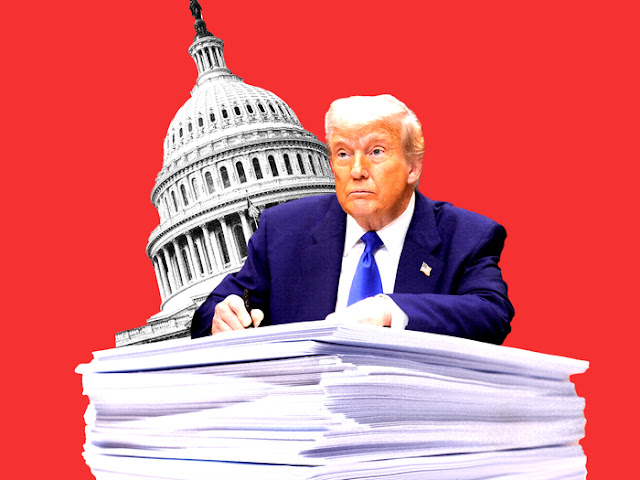Senate Finance Committee Chairman Mike Crapo (R-Idaho) on Monday unveiled a long-anticipated tax and spending proposal that aligns closely with President Donald Trump’s renewed economic agenda, deepening Medicaid cuts and dismantling key elements of the Biden-era clean energy framework. The bill's release sets up immediate clashes with House Republicans and dissenters within the Senate GOP itself.
The 300-plus-page package — dubbed by Trump as the “big, beautiful bill” — would permanently extend the 2017 corporate tax cuts, phase out clean energy incentives enacted during President Biden’s term, slash Medicaid by hundreds of billions of dollars, and raise the federal debt ceiling by $5 trillion.
A Populist Rebrand — with Deep Cuts
Framed as a working-class relief measure, the Senate bill includes tax deductions for tips, overtime pay, and auto loan interest, boosts the standard deduction, and makes current tax brackets permanent. These measures mark a populist turn consistent with President Trump’s pledges to support “forgotten Americans.”
However, the bill also proposes aggressive spending reductions, especially to federal health programs like Medicaid, which serves low-income and disabled Americans.
It goes further than the House-passed version by tightening Medicaid eligibility and introducing stricter work requirements. Adults 19 and older would be required to work, study, or perform community service for 80 hours per month, with fewer exemptions for parents of young children.
Additionally, states that expanded Medicaid under the Affordable Care Act would face new limits starting in 2027 on how they raise revenue through provider taxes, reducing their ability to access federal funds.
“These cuts are deeper, and the red tape is thicker,” said one Republican aide familiar with the drafting process. “It’s still f’d up.”
GOP Rift: Budget Hawks vs. Swing-State Conservatives
The bill has triggered internal divisions among Senate Republicans.
Sen. Rand Paul (R-Ky.) announced his opposition to the $5 trillion debt ceiling increase, calling it “a bridge too far.” Sen. Ron Johnson (R-Wis.) also criticized the measure for failing to confront long-term debt: “We’re not seriously altering our financial trajectory.”
With a narrow majority, Republicans can afford no more than one defection if they hope to pass the bill along party lines.
Moderate and swing-state Republicans, including Susan Collins (R-Maine), Josh Hawley (R-Mo.), Lisa Murkowski (R-Alaska), and Jerry Moran (R-Kan.), have voiced concerns about cuts to Medicaid and rural hospital funding.
Hawley said the bill’s trade-offs are politically toxic:
“We’re paying for green subsidies by defunding rural hospitals. That won’t fly in Missouri.”
Energy and Tax Provisions Stir Further Debate
The Senate proposal removes the House’s most aggressive anti-green energy measures, such as forcing new clean energy projects to break ground within 60 days. Still, it imposes new limits — including a 2026 expiration for clean hydrogen tax credits — which may jeopardize planned infrastructure projects in states like West Virginia. Sen. Shelley Moore Capito (R-W.Va.) is reportedly seeking changes.
The bill raises the child tax credit to $2,200, below the $2,500 level favored in the House, but includes inflation indexing. Sen. Hawley called the increase “too low” and signaled that family policy conservatives may demand further adjustments.
The bill would also make permanent the $10,000 cap on state and local tax (SALT) deductions, reversing a House-negotiated compromise that temporarily raised the cap to $40,000 to win support from suburban Republicans.
“The Senate is putting the entire bill at risk,” warned Reps. Young Kim (R-Calif.) and Andrew Garbarino (R-N.Y.), co-chairs of the House SALT Caucus.
SNAP, Medicare, and Omissions
The Senate bill softens some of the House’s stricter proposals to cut food assistance. Under the revised plan, states can avoid reductions to SNAP (food stamps) if they improve payment accuracy — a concession welcomed by Senate Agriculture Chair John Boozman (R-Ark.).
Notably, the Senate version avoids cuts to Medicare Advantage, a popular program Trump has consistently vowed to protect despite behind-the-scenes pressure to find savings in entitlement programs.
Outlook: Rocky Path Forward
With tensions mounting, the path to final passage remains unclear. Senate Republicans will need near-total unity to move the bill forward, while House GOP leaders are already expressing frustration over provisions altered or removed during negotiations.
The Congressional Budget Office estimated the House version would lead to nearly 11 million more uninsured Americans over the next decade and would increase the federal deficit by $2.4 trillion, despite $1.6 trillion in spending cuts.
Whether the Senate’s version—with even deeper Medicaid cuts and a broader tax overhaul—improves that forecast is uncertain. What is clear is that internal GOP disagreements remain a formidable barrier.
Asked whether her input had been included in the final draft, Sen. Collins responded with characteristic understatement:











